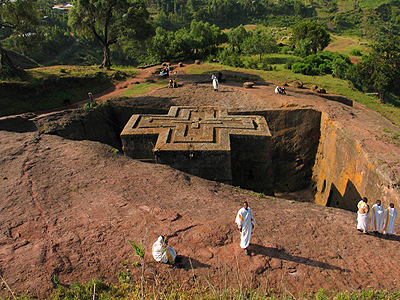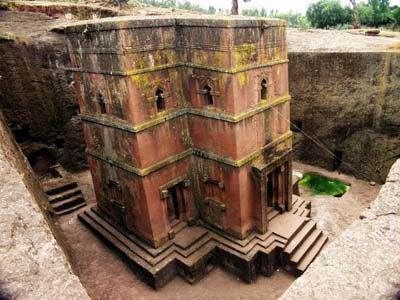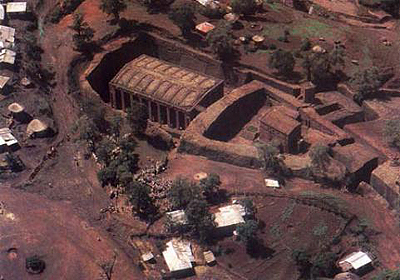|
In the 12th century, King Lalibela
built 12 monolithic churches from stone, and these
are still in use today. Most of the churches are connected with each
other through corridors,
comparing the complex with a labyrinth.
A visit of Lalibela on one of the four Ethopian holidays is particularly
spectacular.

Lalibela (1185 - 1225), whereby
the location is named after him, was the name of the most
important king from the Zagwe Dynasty. He ruled the Lasta Empire. About
1250, he ordered the
building of eleven churches, each built completely out of the surrounding
cliff formations,
being up to 800 m² and 10 m high. These buildings are considered
as the largest and most
elaborate monolithic man-made structures in the world. The churches
still serve their original
purpose and are visited by orthodox pilgrims. The kingdom of Ethiopia
was founded around
Lalibela around the 12th century, rising from the collapse of the Aksum
Empire.

Angels helped, because no one can imagine that man is able to build
such structures as
the rock churches of Lalibela. Isolated, in 2600 m of height, for over
800 years, unknown builders
began to chisel multi-storey churches in the red basalt lava at the
behest of the christian king.
The ability to form such monumental buildings out of boulders with high
precision are since long lost.
Only the legends were passed down, reaching Europe with a fabulous christian
empire
at the Horn of Africa. A second Jerusalem hides behind the Ethopian
mountains. Even to this
day christian pilgrims travel to Lalibela. Here they find the confirmation
for the original belief,
the wonder of the feeding of thousands, the resurrectiono of the dead
and the gigantic works
of these rock churches. The believers meet there at an uncomparable
place of architecture.
Enemy invaders that attacked the Ethiopians from time to time have left
the covered churches relatively undamaged. The original decor with paintings,
frescos and handwritings is still kept in various parts.
They recount the history of the oldest christian political system that
has resisted all conversions.
The old christrian fellowship is a lively part of the world cultural
heritage of Lalibela.

|